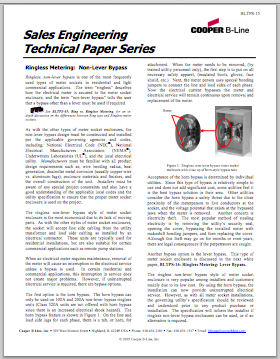Cooper B-Line’s Ringless Metering: Non-Lever Bypass white paper explains what a ringless non-lever bypass style of meter socket enclosure is and how it’s cost and benefits compare to other types of meters.
Excerpt:
Ringless, non-lever bypass is one of the most frequently used types of meter sockets in residential and light commercial applications. The term “ringless” describes how the electrical meter is secured to the meter socket enclosure, and the term “non-lever bypass” tells the user that a bypass other than a lever must be used if required.
As with the other types of meter socket enclosures, the non-lever bypass design must be constructed and installed per the applicable governing agencies and codes, including; National Electrical Code (NEC), National Electrical Manufacturers Association (NEMA), Underwriters Laboratories (UL), and the local electrical utility. Manufacturers must be familiar with all product design requirements such as; wire bending radius, heat generation, dissimilar metal corrosion (usually copper wire vs. aluminum lugs), enclosure materials and finishes, and the overall construction of the unit. Installers must be aware of any special project constraints and also have a good understanding of the applicable local codes and the utility specification to ensure that the proper meter socket enclosure is used on the project.
The ringless non-lever bypass style of meter socket enclosure is the most economical due to its lack of moving parts. As with the other styles of meter socket enclosures, the socket will accept line side cabling from the utility transformer and load side cabling as installed by an electrical contractor. These units are typically used for residential installations, but are also suitable for certain…>>Read More

